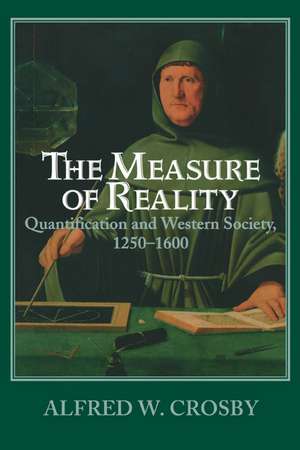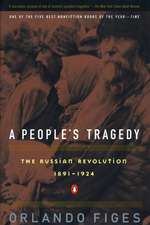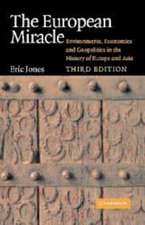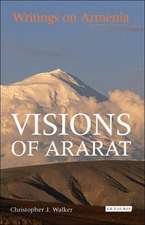The Measure of Reality: Quantification in Western Europe, 1250–1600
Autor Alfred W. Crosbyen Limba Engleză Paperback – 12 dec 1997
| Toate formatele și edițiile | Preț | Express |
|---|---|---|
| Paperback (1) | 158.94 lei 6-8 săpt. | |
| Cambridge University Press – 12 dec 1997 | 158.94 lei 6-8 săpt. | |
| Hardback (1) | 643.66 lei 6-8 săpt. | |
| Cambridge University Press – 27 noi 1996 | 643.66 lei 6-8 săpt. |
Preț: 158.94 lei
Nou
Puncte Express: 238
Preț estimativ în valută:
30.41€ • 31.75$ • 25.17£
30.41€ • 31.75$ • 25.17£
Carte tipărită la comandă
Livrare economică 04-18 aprilie
Preluare comenzi: 021 569.72.76
Specificații
ISBN-13: 9780521639903
ISBN-10: 0521639905
Pagini: 262
Ilustrații: 19 b/w illus.
Dimensiuni: 152 x 226 x 17 mm
Greutate: 0.37 kg
Ediția:Revised
Editura: Cambridge University Press
Colecția Cambridge University Press
Locul publicării:New York, United States
ISBN-10: 0521639905
Pagini: 262
Ilustrații: 19 b/w illus.
Dimensiuni: 152 x 226 x 17 mm
Greutate: 0.37 kg
Ediția:Revised
Editura: Cambridge University Press
Colecția Cambridge University Press
Locul publicării:New York, United States
Cuprins
Part I. Pantometria Achieved: 1. Pantometria, an introduction; 2. The venerable model; 3. Necessary, but insufficient; 4. Time; 5. Space; 6. Mathematics; Part II. Striking the Match: Visualization: 7. Visualization, an introduction; 8. Music; 9. Painting; 10. Bookkeeping; Part III. The New Model.
Recenzii
'In this thoroughly fascinating monograph, Alfred W. Crosby asks a fundamental question: How and why did it come to pass that Europeans, seemingly backward bumpkins in medieval times, became so successful as imperialists?' John Allen Paulos, LA Times
'The Measure of Reality has all the intellectual scope, vivid detail, imaginative interpretation and delicious wit that I expected from Crosby's earlier books. Here Crosby argues that Western Europeans were better imperialists than any humans before them in part because, from the thirteenth century onward, they thought about reality in quantitative terms and did so more consistently than other peoples. There is an important lesson here for today.' Joel E. Cohen, Rockerfeller University
'Crosby shows us how Europeans prepared for their world encompassing expansion after 1500 by learning how to measure, calculate and control the world around them by breaking reality into equal, arbitrary units. The Measure of Reality is a brilliant, provocative essay, as original and persuasive as his earlier Ecological Imperialism. A really significant little essay, full of new information and delightfully written as well.' William H. McNeill
'Western Europe did remake itself during that thousand years in a way that no other culture in the world did - or even attempted to do. And that is the transformation addressed in a very accessible and readable way by Crosby's stimulating, wide-ranging study of the intellectual development of the medieval West.' Richard Holt, The New York Times Book Review
'The Measure of Reality has all the intellectual scope, vivid detail, imaginative interpretation and delicious wit that I expected from Crosby's earlier books. Here Crosby argues that Western Europeans were better imperialists than any humans before them in part because, from the thirteenth century onward, they thought about reality in quantitative terms and did so more consistently than other peoples. There is an important lesson here for today.' Joel E. Cohen, Rockerfeller University
'Crosby shows us how Europeans prepared for their world encompassing expansion after 1500 by learning how to measure, calculate and control the world around them by breaking reality into equal, arbitrary units. The Measure of Reality is a brilliant, provocative essay, as original and persuasive as his earlier Ecological Imperialism. A really significant little essay, full of new information and delightfully written as well.' William H. McNeill
'Western Europe did remake itself during that thousand years in a way that no other culture in the world did - or even attempted to do. And that is the transformation addressed in a very accessible and readable way by Crosby's stimulating, wide-ranging study of the intellectual development of the medieval West.' Richard Holt, The New York Times Book Review
Descriere
This 1997 book discusses the shift to quantitative perception which made modern science, technology, business practice and bureaucracy possible.














